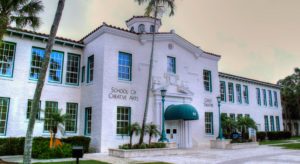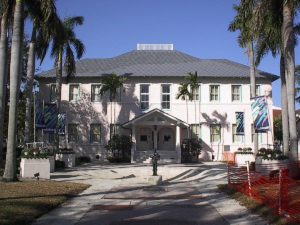
There’s a darkness in the center of town.
Anniversaries are funny things.
We mark the dates we like to celebrate—weddings, first dates, the opening of businesses. But we also mark the dates we’re troubled by—the loss of a loved one, the break up of a relationship, hurricanes etc.
For many in our community, 8/10 has become a date they will remember.
On August 10, 2021, the Delray Beach City Commission voted 3-2 to sever their relationship with Old School Square and terminate a 32 year history with the organization that created and largely funded that magical place on the corner of Atlantic and Swinton that catalyzed the rebirth of our downtown and became the creative hub of our community.
A year later, the theater and museum remain dark despite sssurances from the commission majority and the City Manager that there would be a “seemless” transition with more and better cultural opportunities.
Instead, we’ve been left with expensive litigation, embarrassing headlines for the city and big bills ahead for taxpayers to get the place up and running again.
Over the past year, we have witnessed oodles of accusations against the volunteers and donors who lovingly supported Old School Square and worked on behalf of our community for decades.
Some of those volunteers and donors have been so poorly treated that they have vowed to never serve again. Others are steadfast in their resolve to not be bullied and have vowed to continue their efforts to bring a modicum of common sense back to a town that once was a beacon for other cities to admire and follow.
But divisive politics and a nonstop turnstile of staff at City Hall have left us with a lot of damage and dysfunction.
Everywhere you go these days, people ask “what happened to Delray? “
We used to hear: “I wish our town got along as well as your town does.”
That’s a big swing in sentiment.
So why does it matter?
After all, the downtown is teeming with visitors, property values continue to soar and tourists are still flocking to “America’s Most Fun Small City.”
Indeed, all of those things are true. And I would argue that’s a testament to the good work that began in the late 80s with the Atlantic Avenue Task Force, Visions 2000, the Decade of Excellence, the Downtown Master Plan and other efforts large and small ranging from the Community Land Trust, the Cultural Plan, Southwest Plan and an important and groundbreaking initiative to improve race relations. There was a lot of good work done in this town. The success we’ve experienced was not an accident. It was planned and made possible by a generation of volunteers who cared passionately about working together to buld a better community.
At the center of it all was Old School Square.
Not only was the project a catalyst for downtown revitalization and civic renewal, but it was a place to gather, dream, talk things over and soak up the arts with a slew of memorable performances and exhibitions lovingly curated and made possible by local leaders who dreamt of making this a special place —and succeeded.
So this anniversary is a sad one.
Because we have lost so much. And I contend that the success mentioned before is endangered by a political culture that prizes personal retribution over doing what’s best for the community.
A month or so ago, the city went back to the old playbook and held a charrette, or gathering, to determine what should happen at Old School Square.
Charrettes are great and there is a rich history of successful ones that made a profound difference in our town.
But the spirit of a charrette is to allow stakeholders to dream unencumbered and this one violated that basic and fundamental tenet. Attendees were told to focus on “what” should happen at Old School Square not “who” should run the place.
That struck many as unfair.
But the city didn’t want to be embarrassed because the optics would have been bad if the stakeholders said they liked what they had. Besides, a majority of the commission had already decided that they wanted the Boca Museum and two local artists to be in charge only to see that idea fizzle out.
Lo and behold, the outcome of the charrette proved quite interesting and predictable really. The stakeholders who attended—many stayed away because they didn’t trust the process—said they wanted largely what they had before with the organization that was booted from the premises.
Many of us were not surprised because while Old School Square was by no means perfect or all that it could be, they were doing a whole lot right and there was no public clamor for a change.
So why was the group booted from the place they created? Why was there a sense of urgency to get rid of a group that provided 75-80 percent of the funding to support things like free concerts, art exhibits, theater productions and classes?
The answer to those questions can be found in one word: Politics (with a capital p).
Pure and simple.
The board, the donors and the volunteers pissed off a few people who had the power to break the place.
Why?
What did these people do that was so heinous?
Well, they didn’t support the right candidates as deemed by the powers that be.
And that’s why we hear the refrain that whoever inherits those buildings should be apolitical or perhaps from another community entirely. Really?
We should ask involved citizens to not have an opinion? We should ask another community to come in and run cultural programs in our town?
So I wonder.
I wonder if the board, donors, volunteers and supporters of Old School Square had supported the so-called “right candidates” if there would be a clamor to make non profit board members apolitical or if there would be this need to bring in Boca to run our community’s beating heart.
I doubt it.
Granted, non-profits should not be political.
But individuals who choose to volunteer shouldn’t have to disenfranchise themselves to serve. Old School Square was not political. But the people involved do have opinions and they are entitled to be citizens. Instead of doing what you can to “make those people go away” perhaps the powers that be ought to look in the mirror and ask why a large segment of community leaders and volunteers are unhappy with their politics. Maybe, they should even talk to those who disagree with them. I know that’s a radical concept, but some dialogue might have saved the taxpayers millions of dollars because that’s what it is going to take to fix this mess.
For the past year, the board, donors, volunteers and supporters of Old School Square have been excused of being “political”, “double dipping” (whatever that is) and even worse. But all they’ve been doing is fighting for something they believe in. Bullies don’t like that. They like to dish it out, they don’t like it when you push back.
There have been no conversations to solve this expensive problem, no efforts to settle the litigation, establish dialogue or work things out.
Instead, we’ve seen a once effective CRA weaponized by politics and used as a cudgel to strike back at those who have dared to stand up for what they believe in. The latest is the CRA effort to get the Small Business Administration to investigate PPP funds used to get Old School Square through a horrible and unforeseen pandemic.
All of this matters because all of this comes with a cost.
It will take millions of taxpayer dollars to bring Old School Square back on line. Millions of dollars to make the darkened Crest Theatre function again and get the museum up and running. PS those millions were already raised and being deployed when the plug was pulled.
The generous donor who paid to improve the Cornell Museum, renovate the Crest Theater and add a long coveted commercial kitchen so the organization could host more and better community events pulled her funds and recently spoke before the commission to ask what happened and why those beloved buildings are still dark a year later.
I wonder if other donors were watching and thinking maybe they ought to invest elsewhere. Yes, there is a hidden cost to this brand of politics.
A year ago, I wrote two emails to our latest City Manager Terrance Moore.
The first was to welcome him to our city and wish him well. I wished Mr. Moore success because we’ve had 9, 10 or a hundred (I forget) City Managers come and go (many humiliated and two with lawsuits) since David Harden retired in 2012 after 22 years in the job.
We need a good manager. We need one to succeed and build a staff that can effectively serve our community.
I got a nice reply back from Mr. Moore at the time.
My second email was a cautionary one after the August 10 decision. I felt that the Manager’s messaging was political and that it was dangerous because managers need to serve both sides of the divide. I also felt,and still do, that he does not grasp the enormity of the mistake that was made and the monumental task it will be to bring back Old School Square.
Those who know would have cautioned Mr. Moore that the transition would not be seemless and that there are many moving parts to consider and understand that he simply doesn’t get. How can he? He’s brand new to our community.
I don’t fault Mr. Moore for the decision. He didn’t make it. But I do fault him for not speaking truth to power and for failing to talk to a wide swath of the community on this issue to gain a better understanding of the importance of Old School Square.
The lesson here, as we mark a sad anniversary, is that before you break something you really need to be confident you can put it back together again.
I’ve seen a lot of things broken in recent years by people who weren’t around when things got fixed.
Cities are delicate organisms—resilient only to a point. Pull a thread here and there and you may get lucky. But pull the wrong thread and a place can unravel.
The sad lesson is something that can take 30 plus years to build can be broken in one night by one vote. And it wasn’t even on the agenda…so you , the ones who pay the bills, didn’t get a chance to say stop.

